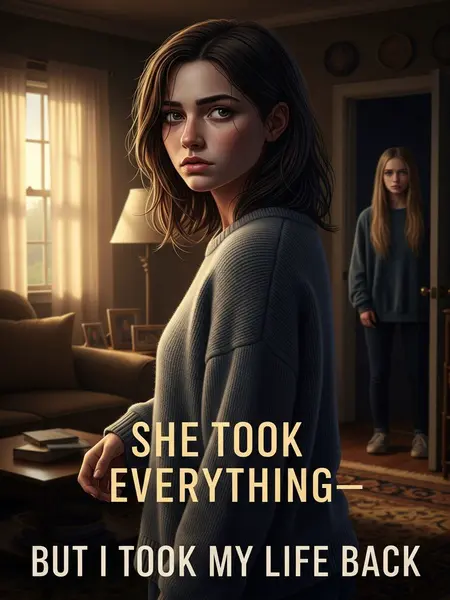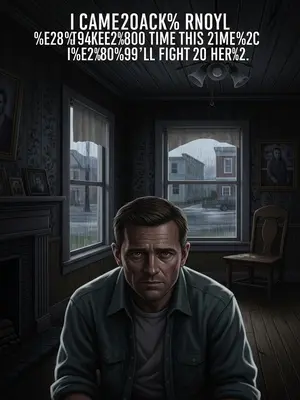Chapter 2: Stolen Sisters, Shattered Bonds
My stepfather’s last name was Porter. I called him Mr. Porter.
He was tall, broad-shouldered, with a bristly mustache and a handshake that could crush your fingers. I never called him Dad—it didn’t feel right.
Rumor was, Mr. Porter’s wife left him for her rich boss because she thought he was a loser. When she got caught cheating, she divorced him and ran off.
People in the neighborhood whispered about it. He was the guy who got left behind, the one with a chip on his shoulder. The story followed him around like a bad smell.
Mr. Porter had a daughter, Madison Porter, three months younger than me.
She was petite, with big blue eyes and a pout that could melt adults in seconds. She always wore her hair in perfect braids and had a way of making herself the center of attention.
She pointed at my hair. “Ava, your clip is so pretty.”
She said it in that sing-song voice little girls use when they want something. I felt her eyes on the clip, and I suddenly wished I hadn’t worn it.
Mom smiled. “Madison, you like butterfly hair clips? I’ll get you one next time.”
Mom’s voice went all sweet and warm, the way she used to talk to me when I was little. It made my stomach twist.
Madison’s face lit up, all innocence. “Really? The exact same as Ava’s?”
She looked at me like I was a walking toy store. I could already feel trouble brewing.
Mom hesitated, then asked me, “Where did you buy that clip? Are there any more?”
Her tone was hopeful, as if I could magically produce another one out of thin air.
I shook my head honestly. “I got it ages ago from a little shop outside my old school. They don’t sell them anymore.”
I tried to sound casual, but I clutched the clip a little tighter, hoping that would be the end of it.
What Mom did next shocked me. She reached out, took the clip from my head, and handed it to Madison.
It happened so fast, I barely had time to react. One second, the clip was in my hair; the next, it was in Madison’s hands.
“Madison, it’s not that I won’t buy you a new one—there really aren’t any more. This one’s a bit old, don’t mind that, okay?”
Mom spoke gently, as if giving away my things was the most natural thing in the world. Madison grinned and pinned it on without a second thought.
She spun in front of the mirror, admiring herself. The clip looked out of place in her perfect hair, but she didn’t care. I felt a lump form in my throat.
I was crushed. “Mom, that’s my hair clip!” I shouted. I felt my stomach drop.
Mr. Porter frowned. “Madison, be good, give the clip back to your sister.”
He sounded annoyed, but not really angry. Like he just wanted the noise to stop.
Madison’s eyes filled with tears. “Boohoo, I just really like that clip! Everyone else has a mom who cares about them, but not me! I don’t have pretty clothes or shoes. The other kids all laugh at me for not having a mom!”
Her voice wobbled, and fat tears rolled down her cheeks. She turned her sad little face to the adults, milking their sympathy.
I didn’t get her logic. What did the clip have to do with having a mom? And anyway, my mom didn’t buy it for me.
I stood there, mouth open, trying to figure out what planet she was from. But it didn’t matter—she’d already won them over.
But her move worked. No one cared if what she said made sense. Both adults just felt sorry for her and started comforting her. No one mentioned the clip again.
Mom wrapped her arms around Madison, cooing softly. Mr. Porter patted her back. I stood there, invisible, my hair still flattened where the clip had been.
Mom put on her loving-mother face and said gently, “Madison, from now on, I’m your mom. I’ll buy you pretty clothes and shoes and dress you up all nice—let’s see who dares make fun of you then!”
She sounded so proud, like she was rescuing a lost puppy. I bit my lip and tried not to cry.
It was obvious Mom was happy with her new life.
She glowed in a way I hadn’t seen since before Dad died. She baked cookies, hummed while folding laundry, and called Mr. Porter "honey" in front of us.
She went back to being a housewife—cooking, cleaning, doing laundry. With a husband again, she seemed to have found her anchor, like a stray dog finally curling up in a warm spot. She threw herself into homemaking, as if a spotless kitchen and home-cooked meals could patch up everything that was broken. She seemed lighter, somehow—like she’d finally stopped looking backward.
I realized her way of thinking was just different from mine.
She wanted normalcy, routine. I wanted love. Maybe that was the difference.
When it was just the two of us, Mom barely did any chores. I ate breakfast out, came home for lunch, which she often forgot to make. I’d chalk it up to her still grieving. At night, I’d make dinner, clean up, and then do my homework.
I told myself she was just tired, that she’d get better. I never complained. I figured she needed more time.
After she remarried? Mr. Porter worked shifts. If he had the early shift, he’d get up at five, so Mom would get up at five to make him breakfast.
She’d tiptoe around the kitchen, careful not to wake anyone. The smell of frying bacon and fresh coffee would drift through the house before sunrise.
At first, Mr. Porter said she didn’t have to—he could just grab a breakfast sandwich on his way to work. But Mom insisted. She said he did hard physical work and needed a good meal. She said getting up early was nothing compared to what he did.
She sounded almost proud to be needed again. She’d say, “He works so hard, the least I can do is send him off with a full stomach.”
After a few of her breakfasts, Mr. Porter never mentioned not wanting her to get up early again.
He’d grunt his approval, clear his plate, and leave without a word. Mom would watch him go, a satisfied smile on her face.
Mom took pride in that, thinking her husband’s love for her cooking was proof of her worth.
She started collecting new recipes again, clipping coupons, and bragging to her friends at church about her fluffy pancakes and homemade biscuits. It was like she was living for his approval.
After serving Mr. Porter, she’d make breakfast for me and Madison. We got up at seven and ate before school.
She’d have two breakfast spreads ready—one hearty, one sweet. The kitchen always smelled like syrup and coffee.
Why two breakfasts? Because Madison and Mr. Porter liked different things. Mr. Porter wanted filling stuff like eggs, sausage, or pancakes. Madison preferred oatmeal, yogurt, or waffles.
Mom never complained, but the circles under her eyes grew darker. I wondered if anyone else noticed.
Actually, Madison and I had different tastes too—she liked sweet and rich, I liked things light. But to avoid making Mom cook three times, I just ate whatever Madison wanted.
I’d force down syrupy waffles even when I wanted plain toast. It was easier than making a fuss.
Mom always said it wasn’t hard, but I could see how tired she was. She was my mom; I was the only one who really worried about her.
After breakfast, I’d quietly clear my plate and help her tidy up. Sometimes I’d sneak her a cup of tea, hoping it would help.
At night, I’d help her wash dishes, clean up, do what I could.
We’d stand side by side at the sink, hands in soapy water. It was the only time we ever talked, just the two of us. I tried to make her laugh, even if it was just a little.
But Mr. Porter and Madison? They never lifted a finger around the house. Not once. Not ever.
They’d lounge on the couch, watching TV or scrolling on their phones, while Mom and I did everything. It felt unfair, but Mom never said a word.
Compared to my dad, Mr. Porter didn’t measure up at all. He was the kind of guy who always had to be right. Always angry, always yelling.
Dad was gentle, never once raised his voice at Mom, and always helped with chores. I barely remember Mom mopping the floor, because after dinner, she’d wash dishes while Dad wiped the table and mopped.
Our old house was always full of laughter and clinking dishes. Dad would whistle while he swept, and Mom would tease him about missing spots.
Dad’s paycheck went straight to Mom; he hardly spent money on himself and always checked with her before buying anything.
He’d hand over his envelope on payday, smiling like he was proud to provide. Mom would tease him about his ugly old wallet, and he’d just laugh.
Mr. Porter wasn’t like that. He gave Mom $300 a month for groceries and left everything else to her. That was it. Three hundred bucks, dropped on the counter, no questions asked.
How could $300 cover a whole family? Especially with Madison always asking Mom for stuff.
Mom would stretch every dollar, clipping coupons and buying in bulk. But Madison’s wish list was endless—designer jeans, the latest sneakers, you name it.
But Mom never complained—she still had money. She used the money from Dad’s accident and his savings to make up the difference.
She dipped into the savings every month, saying it was temporary. I watched the numbers dwindle and said nothing.
She didn’t think there was anything wrong with this. She’d say it was their shared responsibility as adults. Mr. Porter earned money, she spent hers, that was fair.
She’d shrug. “That’s what families do.” I saw the worry in her eyes—she felt uneasy, even if she’d never admit it.
Sometimes I wanted to knock some sense into her. After being with someone as caring as Dad, how could she be so content with her new marriage?
I wanted to shake her, make her see what she was settling for. But she looked so happy, I didn’t have the heart.
I felt bad for her, but since she was happy, there was nothing I could do.
I kept my worries to myself. I figured if she was content, maybe that was enough.
As for me, my expectations for this new family were simple: peace and staying out of each other’s way.
I set the bar low. I just wanted quiet, a place to study, and maybe a little kindness now and then.
Clearly, not everyone agreed.
It didn’t take long to realize some people thrived on chaos.
Ever since the butterfly clip incident, I’d noticed Madison’s hostility.
She’d glare at me across the table, whisper behind my back, and smile sweetly whenever Mom was watching. It was like living with a cartoon villain.
She liked to take my things, pick fights, and watch Mom favor her.
She’d swipe my pencils, borrow my sweaters without asking, and then gloat when Mom sided with her. It was a game to her.
After we moved in with the Porters, Madison found all sorts of excuses to get things from Mom—clothes, backpacks, toys, even my old bedsheets. Every time, Mom handed my stuff over without hesitation.
She’d pout and whine until Mom caved. My stuff slowly disappeared, one item at a time.
She never asked if it was okay. It was like my things didn’t belong to me anymore.
I didn’t just take it. The first time Madison took a dress from my closet without asking, I ran to her room and snatched it back. No matter how Mom coaxed or scolded, I held on tight.
I clung to that dress like it was a lifeline. No way. Not this time. I wasn’t going to let her take everything from me.
Madison cried until she was hoarse.
Her wails echoed through the house. Mr. Porter turned up the TV to drown her out. I sat in my room, hugging the dress, heart pounding.
Mom hugged her and soothed her: “Madison, I’ll buy you an even prettier dress tomorrow.”
She stroked Madison’s hair, promising her the world. I watched from the hallway, invisible.
And she did—she bought Madison a dress just like mine, only more expensive and fancier.
It had sparkles and a big pink bow. Madison twirled in front of the mirror, beaming. I felt like I’d lost a battle I didn’t know I was fighting.
From that night on, Mom barely spoke to me. She and Madison went shopping, came back laughing and happy.
The sound of their laughter made my chest ache. I sat alone at the kitchen table, pretending not to notice.
Madison changed into her new dress, clung to Mom’s arm, and cooed, “Thank you, Mom, you’re so good to me.”
She looked at me as she said it, a smirk on her lips. I felt like I was fading away.
Mom smiled. “You suffered before. From now on, you’ll have a mom who spoils you.”
She sounded proud, like she was making up for lost time. I wanted to remind her that I was still there, still her daughter.
Watching them so close, my heart ached. That was my mom.
I blinked back tears, hoping no one would notice. I missed the way things used to be. My throat burned, and the room felt colder than ever.
I said timidly, “Mom, I’ll go start the mac and cheese. What should I cook tonight?”
My voice was barely above a whisper. I just wanted her to look at me, to care.
Mom ignored me and went straight to the kitchen.
She brushed past me like I was a ghost. I stood there, frozen, unsure what to do.
Madison shot me a triumphant look, then ran to the kitchen door and chirped, “Mom, I want fried catfish tonight.”
She said it loudly, making sure I heard. Her smile was pure mischief.
Mom replied dotingly, “Okay, I’ll make it for you.”
She ruffled Madison’s hair, already pulling out the frying pan. I watched them from the doorway, feeling like a stranger in my own home.
Standing in the living room, I felt panicked and helpless. My mom was ignoring me. I couldn’t breathe.
After Dad died, she was all I had. I clung to her love, terrified she’d abandon me.
I told myself she’d come around, that she was just busy. But deep down, I was scared she was slipping away for good.
At dinner, she kept piling food onto Madison’s plate. I bit my lip, wanting to say something, but her cold face stopped me.
I pushed my food around, appetite gone. Madison grinned at me, enjoying every bite.
After dinner, I hid in my room, counting the seconds until late at night.
I stared at the ceiling, waiting for the house to quiet down. My chest felt tight, like I couldn’t breathe.
Mr. Porter and Madison went to bed. Mom was in the shower.
The sound of running water filled the hallway. I paced outside the bathroom door, rehearsing what I wanted to say.
I stood outside the bathroom door, head down, listening to the water, anxious for her to come out.
I fiddled with the hem of my shirt, wishing I could just disappear. But I needed to talk to her—I couldn’t stand the silence anymore.
Click—the door opened. Mom came out, towel drying her hair.
She barely glanced at me, walking past as if I wasn’t there. My heart raced.
“Mom!” The moment I spoke, tears streamed down my face, full of fear, helplessness, and hurt.
I couldn’t hold it in any longer. The words tumbled out, messy and raw.
She ignored me, sat on the couch, and calmly dried her hair.
She moved slowly, methodically, as if nothing was wrong. I stood there, shaking, waiting for her to notice me.
I sobbed quietly, not daring to move.
I wiped my face with my sleeve, afraid to make a sound. The silence felt endless.
Finally, she spoke: “Come here.”
Her voice was cold, but I clung to it like a lifeline. I rushed over, hope flickering in my chest.
Relieved, I ran over.
I knelt beside her, looking up, desperate for any sign of kindness.
She didn’t even let me sit down, just stared at me and said, “Do you know what you did wrong?”
Her eyes were hard, unblinking. I twisted my fingers, heart pounding.
I swallowed hard. “Mom, I was wrong.”
I barely recognized my own voice. I just wanted her to love me again.
She straightened, serious. “Ava, Madison is your sister. You need to take care of her. Don’t be selfish and willful anymore, understand?”
Her words stung, but I nodded. I’d do anything for her approval.
“Okay, Mom,” I whimpered. “Just don’t ignore me.”
I looked at her, eyes pleading. I couldn’t stand being invisible.
“Mm. As long as you listen, I’ll love you like I used to.”
She said it like a promise, but it felt more like a warning.
After that, whenever Madison wanted something of mine, I gave it up without protest. I didn’t want to make Mom angry.
I became a shadow, giving up my things, my space, my voice. Anything to keep the peace.
Why just my old stuff? Because after we moved in together, Mom only bought new things for Madison. My things didn’t interest her anymore.
It was like I’d been replaced. Madison got all the new stuff, and I faded into the background. Like I was just... gone.
Like backpacks—Madison got the brand-name one from the mall; I got the knockoff from a street vendor.
I didn’t complain. I just watched as Madison strutted around with her shiny new bag, showing it off to everyone.
Gradually, our differences in appearance grew more obvious. We lived under the same roof, but she dressed like a princess in designer clothes while I looked shabby and plain.
At school, people started to notice. They’d ask if we were really sisters. I’d just smile and shrug.
We ate at home and, in elementary school, didn’t spend much. Officially, Mom gave us each five bucks a week.
I counted every dollar, saving up for months just to buy a paperback at the book fair.
But I knew Mr. Porter secretly gave Madison more. I could understand—she was his daughter, after all.
He’d slip her a twenty now and then, winking as if it were their little secret. I pretended not to notice.
But what really got me? Mom started slipping Madison money, too.
I caught them once, Mom pressing a folded bill into Madison’s palm. Madison winked at me as she tucked it away.
How did I know? Every time Mom gave her money, Madison would gloat in front of me. “Mom just gave me ten bucks for ice cream!”
She’d wave the bill under my nose, daring me to say something.
I’d look down, saying nothing.
I clenched my fists, but kept my mouth shut. No point fighting a battle I couldn’t win. So I kept quiet, swallowing my pride.
One time, after another round of showing off, I asked Mom for money too.
I worked up the courage, voice trembling. I just wanted a little bit of what Madison got.
“Didn’t I give you allowance? What do you need more for?” she asked.
Her tone was sharp, like I was being greedy.
“I want to buy a set of comic books,” I answered honestly.
I’d been eyeing them for weeks, saving up every penny.
“Ava, you’re a student. Focus on your studies, don’t read those silly books,” Mom said.
She sounded disappointed, like I’d asked for something shameful.
I whispered, “But Madison got a Barbie that cost over a hundred.”
I hated how small my voice sounded.
“How many times have I told you, stop fixating on Madison,” Mom sighed. “Besides, her dad gave her that money. I’m not working, where would I get extra for you?”
She looked away, refusing to meet my eyes.
“But you gave Madison money—she told me,” I protested.
I couldn’t help it. The words just slipped out.
“Ava, you’re my daughter. Can’t you try to understand and think about me? I’m only nice to Madison so they’ll really accept us, so we can have a stable place in this family. It’s all for your own good,” she said earnestly.
She sounded so sincere, I almost believed her. Almost. But it still hurt.
I didn’t agree. We were two families merging, equals. Why did we have to be the ones seeking their acceptance? Why not the other way around?
I wanted to scream: Why is it always us bending over backwards? Why can’t they meet us halfway?
And how was this for my good? Ever since she remarried, my life had gotten worse. I didn’t like this mess of a family at all.
I missed the old days. I missed Dad. I missed feeling like I belonged.
But I never said any of that.
I swallowed my words, afraid of making things worse.
Like Mom said, in this house I was the one closest to her—the only one who truly cared.
It was the only comfort I had left.
I didn’t want to make things harder for her.
So I bit my tongue, kept my head down, and tried to stay invisible.
If anything, it made her worse.
She saw my silence as weakness, and pushed harder every day.













